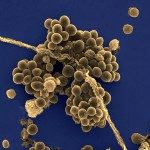Lien vers Pubmed [PMID] – 22206860
Curr. Opin. Microbiol. 2012 Feb;15(1):44-9
Streptococcus agalactiae (group B Streptococcus, GBS), a normal constituent of the intestinal microbiota is the major cause of human neonatal infections and a worldwide spread ‘hypervirulent’ clone, GBS ST-17, is strongly associated with neonatal meningitis. Adhesion to epithelial and endothelial cells constitutes a key step of the infectious process. Therefore GBS surface-anchored proteins are obvious potential adhesion mediators of barrier crossing and determinant of hypervirulence. This review addresses the most recent molecular insights gained from studies on GBS surface proteins proven to be involved in the crossing of the brain-blood barrier and emphasizes on the specificity of a hypervirulent clone that displays meningeal tropism.



